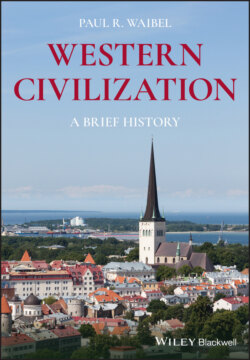Читать книгу Western Civilization - Paul R. Waibel - Страница 48
4 The Birth of Europe Chronology
Оглавлениеc. 500Ambrosius Aurelianus Wins Battle of Mons Badonicus in Britain506Clovis I Converted to Christianity527–565Byzantine Emperor Justinian Codifies Roman Law532–537Church of Holy Wisdom (Hagia Sophia) constructed in Constantinoplec. 610Muhammad Begins Preaching New Muslim Religion732Charles Martel Defeats Arab‐Muslim Army in Battle of Tours714–768Pepin III, First Carolingian King of Franks753Pope Stephen II Grants Pepin III Title, Patrician of the Romans781Alcuin of York Becomes Head of Court School in Aachen793Monastery of Lindisfarne Destroyed by Vikings800Charlemagne Crowned Emperor of the Romans by Pope Leo III843Treaty of Verdun Divides Charlemagne's empire865Twelve‐year Viking Invasion of Britain Begins878Treaty of Wedmore between Alfred the Great and Danes1016–1028Cnut the Great Unites England, Denmark, and Norway1042Edward the Confessor Becomes King of England1066Battle of Hastings1066Duke William of Normandy Crowned King of England
The collapse of the Roman Empire in the West marked the end of the classical, or Greco‐Roman, period of history. The last emperor in the West, Roumulus‐Augustulus, was deposed in 476, but the myth lingered on. A patchwork of Germanic kingdoms emerged, ruled by tribal chiefs, or kings, who pretended to rule in the name of the successors of the Caesars now resident in Constantinople. The Italian peninsula was ruled by Ostrogoths (East Goths). The Visigoths (West Goths) established a kingdom in Spain, having driven the Vandals into North Africa. The Angels and Saxons crossed from northern Germany to Britain, where they established several small kingdoms. The Celts were pushed west into Wales, Cornwall, and Cumberland. The Franks settled in what is today the Low Countries, northeastern France, and western Germany. Other Germanic tribes – Sueves, Jutes, Burgundians, Danes – occupied their own little pieces of the former Roman Empire.
When centralized government vanished, when goods could no longer move across Europe safely on the roads built by the Romans, when commerce and coinage vanished, and the cities died, a new way of life, feudalism, evolved to provide for law and order and livelihood at the grassroots level. The Early Middle Ages was in many ways a “Dark Age,” a period of uncertainty and fear of both the present and the future. But, as the twelfth century approached, and the new invasions of the Vikings, Magyars, and Muslims came to an end, a new civilization began to appear, a synthesis of Classical Civilization, Judeo‐Christianity, and Germanic traditions. Western, or European, Civilization was born.
